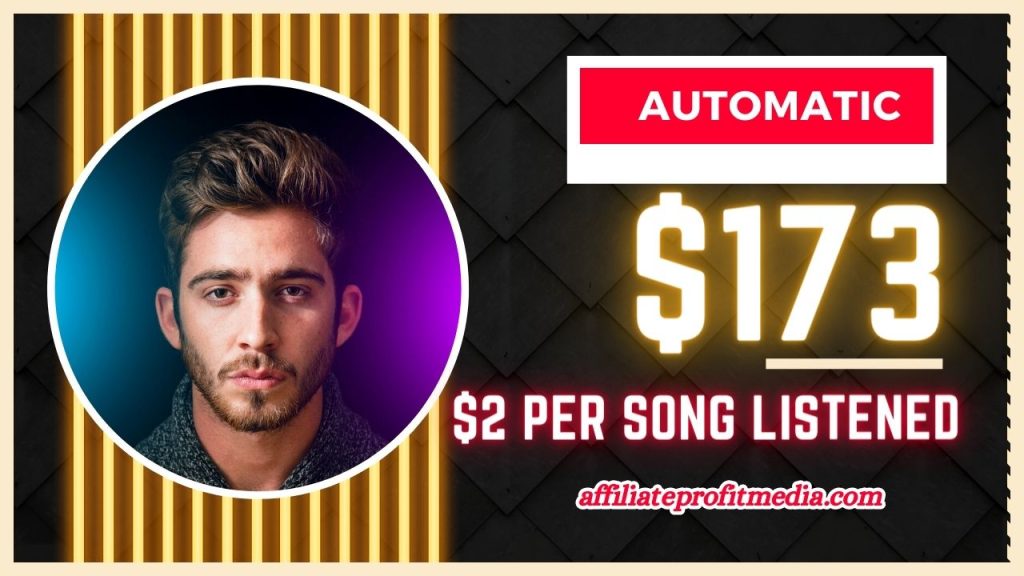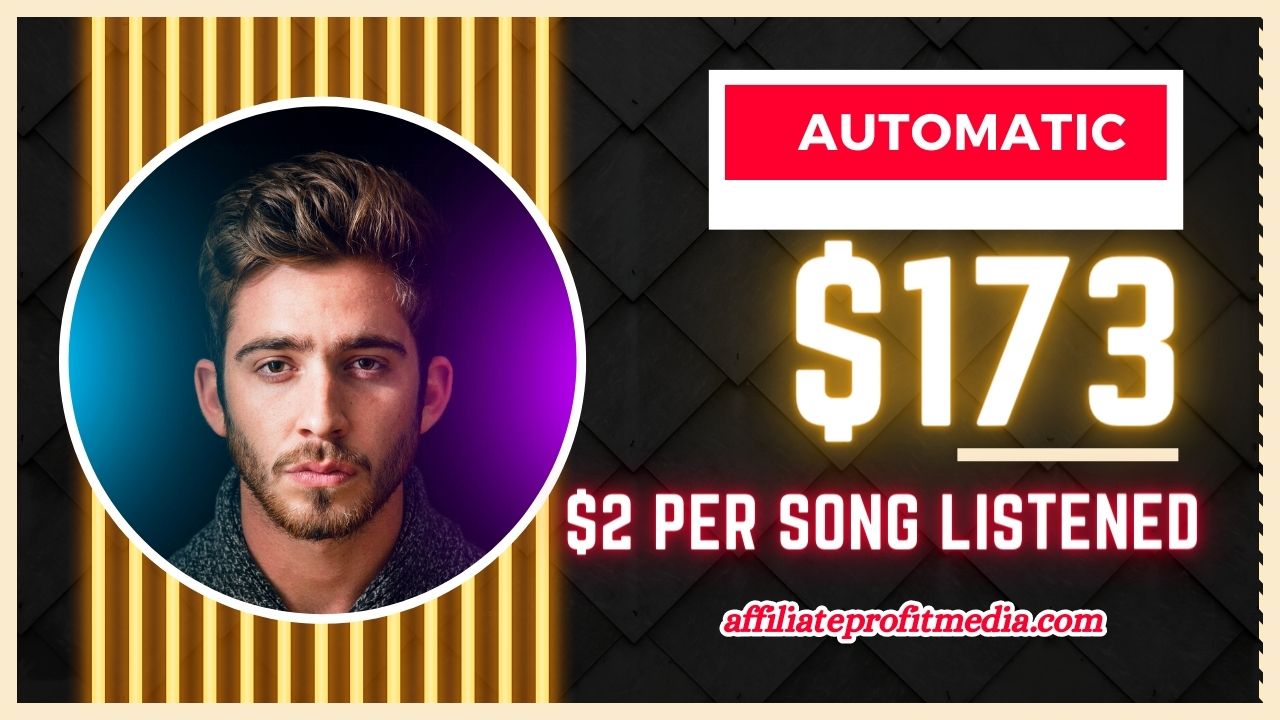One of the most exciting developments is the concept of earning per song listened. This approach allows musicians to earn money every time someone listens to their music, which is a great way to monetize their creative output. Here are five key points to consider when it comes to earning per song listened.
See How We’re Making $100 to $500 daily with 0 investment and FREE traffic
- It’s a fairer way to compensate artists: The traditional model of paying musicians based on album sales or downloads has come under fire in recent years for being unfair to artists. Many musicians feel that they are not being compensated fairly for the music they create, especially since streaming services have become the dominant way that people listen to music. Earning per song listened is a fairer way to compensate artists, as they are paid based on how often their music is actually listened to.
- It incentivizes musicians to create quality music: One of the potential benefits of the per-song model is that it incentivizes musicians to create high-quality music that people want to listen to. If an artist knows that they will be paid for every time someone streams their song, they may be more motivated to create something that people will want to listen to repeatedly. This could lead to a greater focus on quality and a higher overall standard of music.
- It benefits smaller artists: One of the drawbacks of the traditional music industry model is that it tends to favor established artists over up-and-coming musicians. Earning per song listed could help level the playing field for smaller artists, as they would be paid based on the popularity of their music rather than their reputation or marketing budget. This could lead to a more diverse range of music being available to listeners.
- It could lead to a more engaged fanbase: When musicians are paid based on how often their music is listened to, it creates a direct financial incentive for them to build a loyal fanbase. If an artist can get their listeners to stream their music repeatedly, they will earn more money. This could lead to more interaction between musicians and fans, as artists work to build relationships with their listeners and keep them engaged.
- It could change the way we think about music: Finally, the per-song model could have a profound impact on the way we think about music as a society. If we start to value music based on how often it is listened to, rather than on its commercial success or cultural significance, we could see a shift in the kinds of music that are produced and celebrated. This could lead to a more diverse and interesting musical landscape, as musicians are incentivized to create music that is both popular and artistically innovative.

By incentivizing musicians to create high-quality music and building more engaged fanbases, it could help to level the playing field for smaller artists and lead to a more diverse and interesting musical landscape.
It’s a fairer way to compensate artists
For many years, artists in the music industry have been struggling to receive fair compensation for their work. With the rise of digital music streaming services and the decline of physical album sales, the traditional revenue model for artists has been disrupted.
- Paying artists per stream: The most common idea for fairer compensation is to pay artists based on the number of streams their music receives on a particular platform. In this model, artists are paid a small amount of money for each stream, with revenue generated from advertising and subscriptions. This is a fairer approach, as it compensates artists based on how often their music is actually listened to, rather than on sales figures.
- Transparent reporting: Another key factor in fair compensation is transparency. Many artists have expressed frustration over the lack of transparency from streaming services about how much they are paid and how royalties are calculated. Greater transparency in reporting could help artists understand how their music is being consumed and how they are being compensated, leading to more fair and equitable arrangements.
- Fairer distribution of royalties: The traditional music industry model has often been criticized for its unfair distribution of royalties, with a disproportionate amount going to record labels and streaming services rather than the artists themselves. A fairer compensation model would ensure that a greater percentage of revenue goes directly to the artists who created the music.
- Recognizing the value of music: Many people take for granted the amount of work and creativity that goes into producing music. Artists spend years honing their craft and creating unique and original content. A fairer compensation model recognizes the value of music and the significant contribution artists make to society through their creative work.
- Supporting emerging artists: A fairer compensation model would benefit emerging artists and those who are not signed to major record labels. These artists often struggle to receive fair compensation for their work and are at a disadvantage compared to established artists. A compensation model that is fairer to all artists would help to level the playing field and create more opportunities for emerging talent.
See How We’re Making $100 to $500 daily with 0 investment and FREE traffic
Paying artists per stream, transparent reporting, fairer distribution of royalties, recognizing the value of music, and supporting emerging artists are all important factors in creating a more equitable and just music industry.
It incentivizes musicians to create quality music
The music industry has undergone a massive transformation in recent years with the advent of digital streaming services. While these services have allowed listeners to access a wide range of music from around the world, they have also had an impact on the way that artists are compensated for their work.
- It rewards quality over quantity: Under the traditional model, artists were often incentivized to produce as much music as possible in order to generate sales. However, this approach often led to a focus on quantity over quality, with artists feeling pressured to produce music quickly rather than taking the time to perfect their craft. With fair compensation models, such as paying artists per stream, artists are rewarded for the quality of their work rather than the volume.
- It encourages experimentation: When artists are compensated fairly for their work, they are more likely to take risks and experiment with their music. This can lead to a more diverse and interesting range of music for listeners to enjoy. With traditional models, artists may feel pressure to stick to a tried-and-tested formula in order to generate sales. This can lead to a lack of innovation and creativity in the industry.
- It supports artists in pursuing their passion: Music is an art form, and artists should be able to pursue their passion without having to worry about financial concerns. When artists are fairly compensated for their work, they can focus on creating the music they love rather than worrying about how to make ends meet. This can lead to a more authentic and heartfelt approach to music-making.
- It creates a healthier industry: When artists are fairly compensated for their work, it creates a healthier and more sustainable music industry. This is because artists are able to focus on their craft without worrying about financial concerns. This can lead to a more diverse range of music and a more stable industry overall.
- It benefits everyone: When artists are incentivized to create quality music, it benefits everyone involved in the music industry. Listeners are able to enjoy a wider range of music, and artists are able to pursue their passion and create music that truly speaks to them. This creates a more vibrant and exciting industry that is constantly evolving and changing.
By rewarding quality over quantity, encouraging experimentation, supporting artists in pursuing their passion, creating a healthier industry, and benefiting everyone involved, fair compensation models can help to create a more dynamic and exciting music industry for both artists and listeners alike.
It benefits smaller artists
The music industry has undergone a massive transformation in recent years, with digital streaming services playing an increasingly important role in the way music is consumed.
See How We’re Making $100 to $500 daily with 0 investment and FREE traffic
- Greater exposure: Digital streaming services offer smaller artists the opportunity to reach a wider audience than ever before. With millions of listeners using these services to discover new music, smaller artists can gain exposure on a global scale. This exposure can help them to build a fan base and develop a following, which can lead to more opportunities for live performances and other revenue streams.
- Leveling the playing field: The traditional music industry model has often favored established artists over emerging talent. This is because established artists have access to greater resources and marketing power, allowing them to dominate the market. Fair compensation models, such as paying artists per stream, help to level the playing field by ensuring that all artists are compensated fairly for their work. This creates more opportunities for smaller artists to succeed and thrive in the industry.
- More revenue opportunities: Smaller artists often rely on live performances and merchandise sales for the majority of their income. However, these revenue streams can be unreliable and unpredictable. Fair compensation models offer smaller artists the opportunity to earn a more consistent income from their music, which can help to support their careers and allow them to continue creating music.
- Greater creative freedom: When smaller artists are compensated fairly for their work, they are able to focus on creating the music they love without having to worry about financial concerns. This can lead to a more authentic and heartfelt approach to music-making. It also allows smaller artists to take risks and experiment with their music, which can lead to more innovative and interesting work.
- A more diverse industry: When smaller artists are given the opportunity to succeed, it leads to a more diverse and interesting music industry. This is because smaller artists often bring unique perspectives and sounds to the table, which can help to push the industry forward and keep it evolving. By compensating smaller artists fairly, we can ensure that the music industry remains vibrant and dynamic.
By supporting smaller artists, we can help to ensure that the music industry remains innovative, exciting, and accessible to all.
It could lead to a more engaged fanbase
One of the most significant challenges facing musicians today is how to build and maintain an engaged fanbase. While digital streaming services have made it easier than ever for artists to reach a global audience, it can be challenging to keep fans interested and invested in the music.
- Fans want to support their favorite artists: Fans want to support their favorite artists, but they also want to feel like their support is making a difference. By compensating artists fairly for their work, fans can feel like they are contributing to something they believe in. This sense of investment can lead to a deeper connection between fans and artists, which can help to build a more engaged fan base over time.
- Increased transparency: Fair compensation models can also lead to increased transparency between artists and their fans. When artists are paid per stream, fans can see exactly how much their favorite artists are earning from their music. This transparency can help to build trust between fans and artists and create a sense of shared responsibility for the success of the music.
- A sense of community: When fans feel like they are part of a community of like-minded individuals who share their love of music, they are more likely to stay engaged and invested in the music. Fair compensation models can help to create this sense of community by encouraging fans to support their favorite artists and to share their music with others.
- More opportunities for interaction: Fair compensation models can also lead to more opportunities for interaction between artists and their fans. When artists are compensated fairly for their work, they are more likely to be able to invest time and resources into engaging with their fans. This can include things like live performances, meet-and-greets, and social media interactions. By fostering these connections, artists can create a more engaged fanbase that is invested in their music over the long term.
- Increased loyalty: Finally, fair compensation models can lead to increased loyalty among fans. When fans feel like their favorite artists are being treated fairly, they are more likely to stick with them through thick and thin. This can lead to a more stable fanbase that is willing to support the artist through their ups and downs, which can be critical for long-term success in the music industry.
By encouraging fans to support their favorite artists, fostering a sense of community, creating more opportunities for interaction, and increasing loyalty, fair compensation models can help to build a stable, long-term fanbase that is invested in the success of the music. By investing in fair compensation models, artists can create a more sustainable music industry that benefits everyone involved.
It could change the way we think about music
While these services have made it easier than ever for consumers to access music, they have also raised questions about the value of music and how artists should be compensated for their work.
See How We’re Making $100 to $500 daily with 0 investment and FREE traffic
- Music as a valuable commodity: By compensating artists fairly for their work, we can begin to view music as a valuable commodity that is worthy of investment. This shift in thinking could help to create a more sustainable music industry by encouraging consumers to view music as something that is worth paying for. When music is viewed as a valuable commodity, artists are more likely to be compensated fairly for their work, which can help to incentivize them to create high-quality music that resonates with fans.
- The importance of artistry: Fair compensation models can also help to highlight the importance of artistry in the music industry. When artists are compensated fairly for their work, they are more likely to be able to invest time and resources into developing their craft. This can lead to more innovative and creative music that pushes the boundaries of what is possible in the industry. By valuing artistry, we can create a music industry that is more diverse, dynamic, and exciting.
- The role of music in society: When we view music as a valuable commodity that is worthy of investment, we can begin to recognize the important role that music plays in our society. Music has the power to inspire, motivate, and unite people from all walks of life. By compensating artists fairly for their work, we can ensure that music continues to play a vital role in our culture for generations to come.
- A more equitable music industry: Fair compensation models can also help to create a more equitable music industry that benefits everyone involved. When artists are compensated fairly for their work, they are more likely to be able to support themselves financially, which can lead to a more diverse and inclusive music industry. This can help to create opportunities for artists from all backgrounds and ensure that the music industry reflects the diversity of our society.
- The value of music beyond commercial success: Finally, fair compensation models can help us to recognize the value of music beyond its commercial success. While commercial success is certainly important, it is not the only measure of the value of music. By compensating artists fairly for their work, we can help to create a music industry that values creativity, innovation, and experimentation. This can lead to music that pushes the boundaries of what is possible and inspires us to think differently about the world around us.
By viewing music as a valuable commodity, recognizing the importance of artistry, acknowledging the role of music in society, creating a more equitable music industry, and valuing music beyond its commercial success, we can create a more sustainable and vibrant music industry that benefits everyone involved.
I appreciate you reading my full article, Automatic $173 A Day Doing Nothing EARN $2 Per Song Listened.



